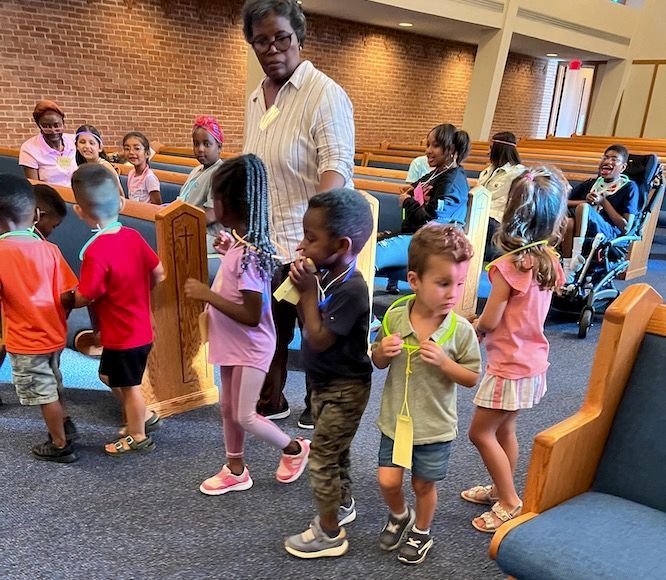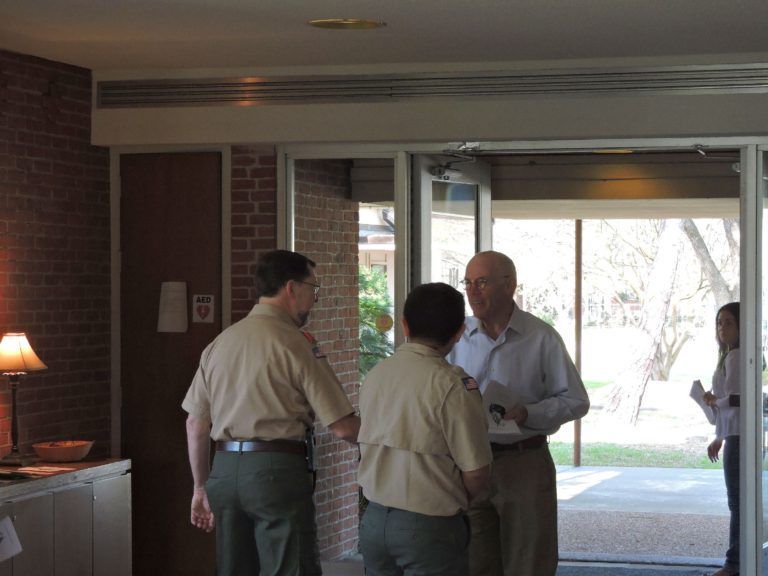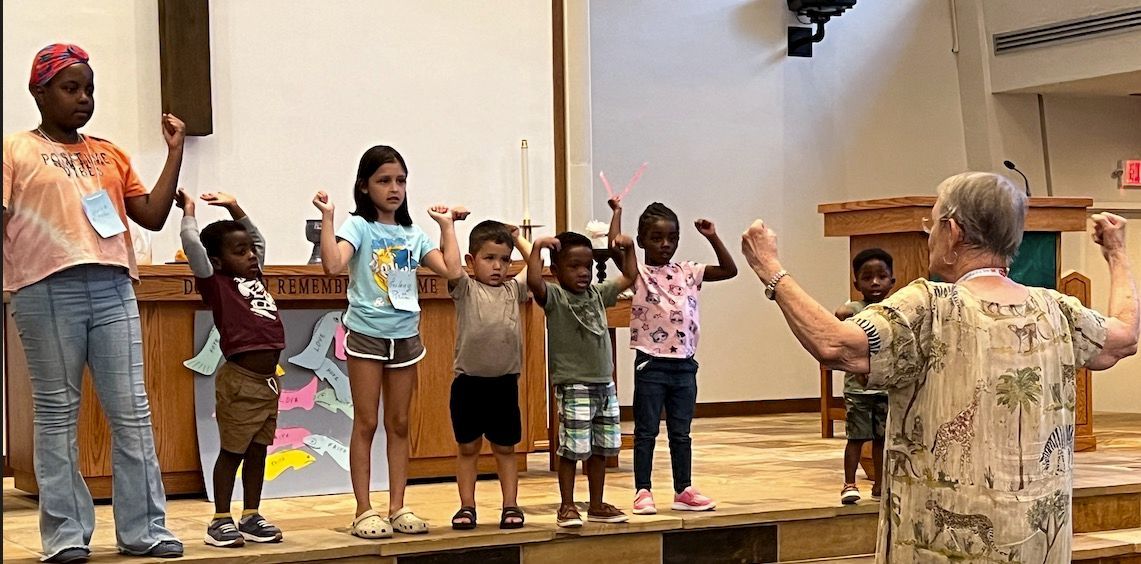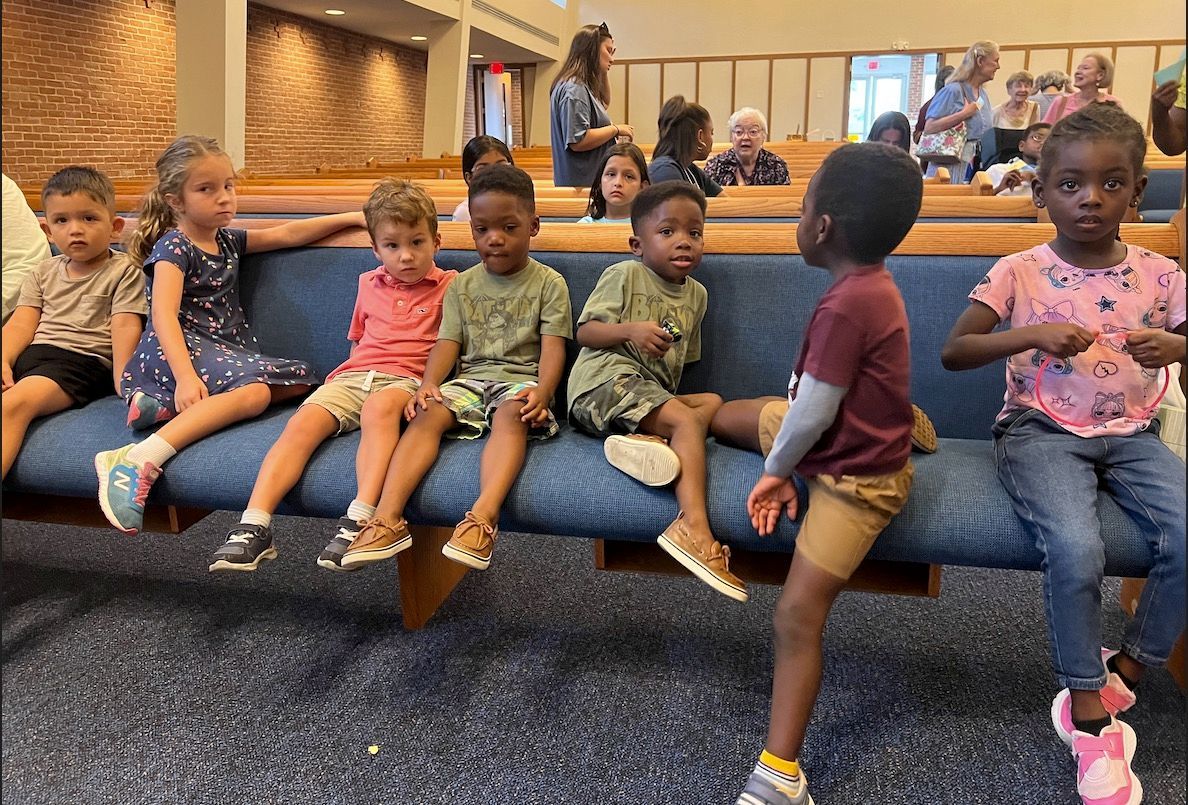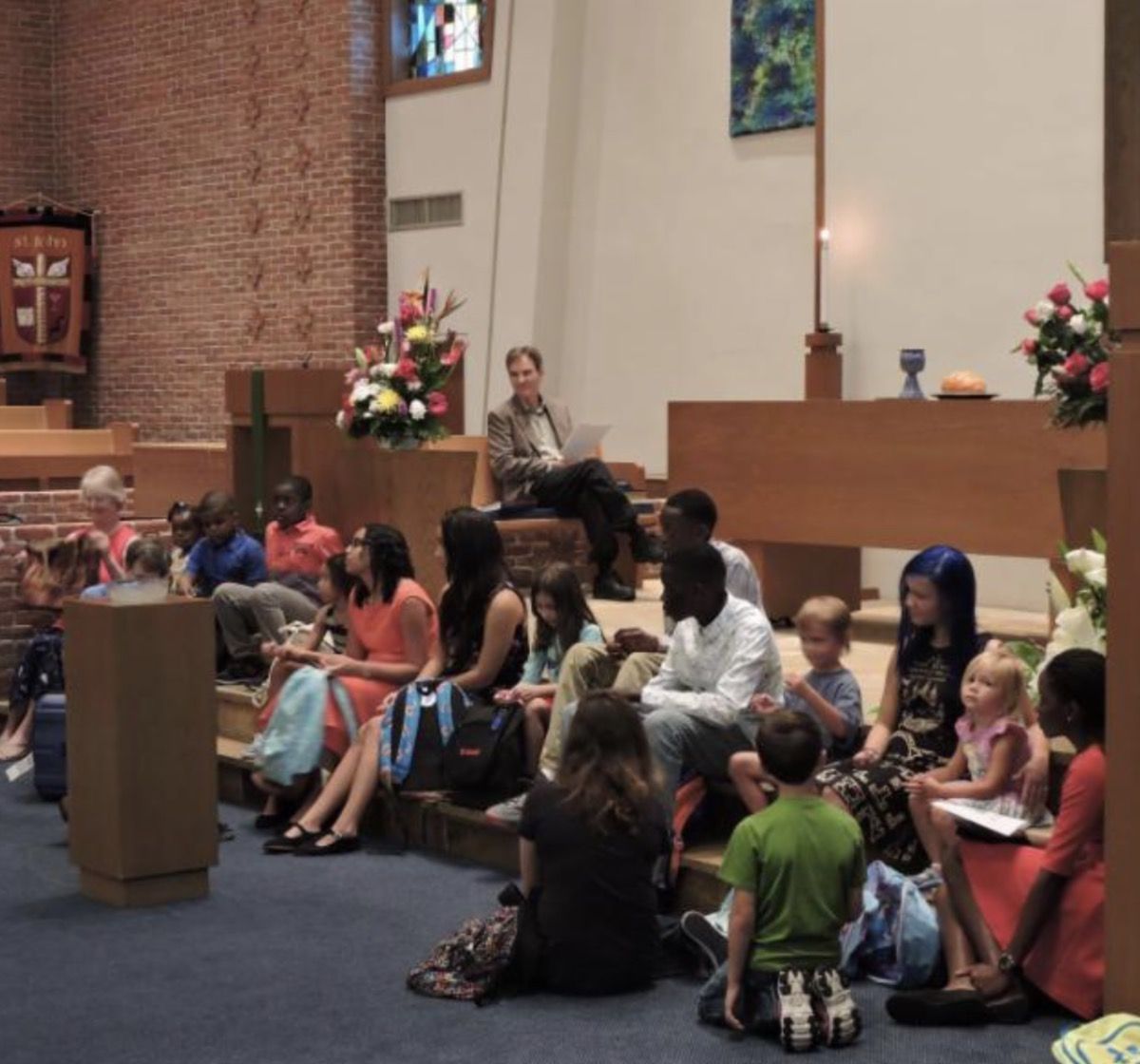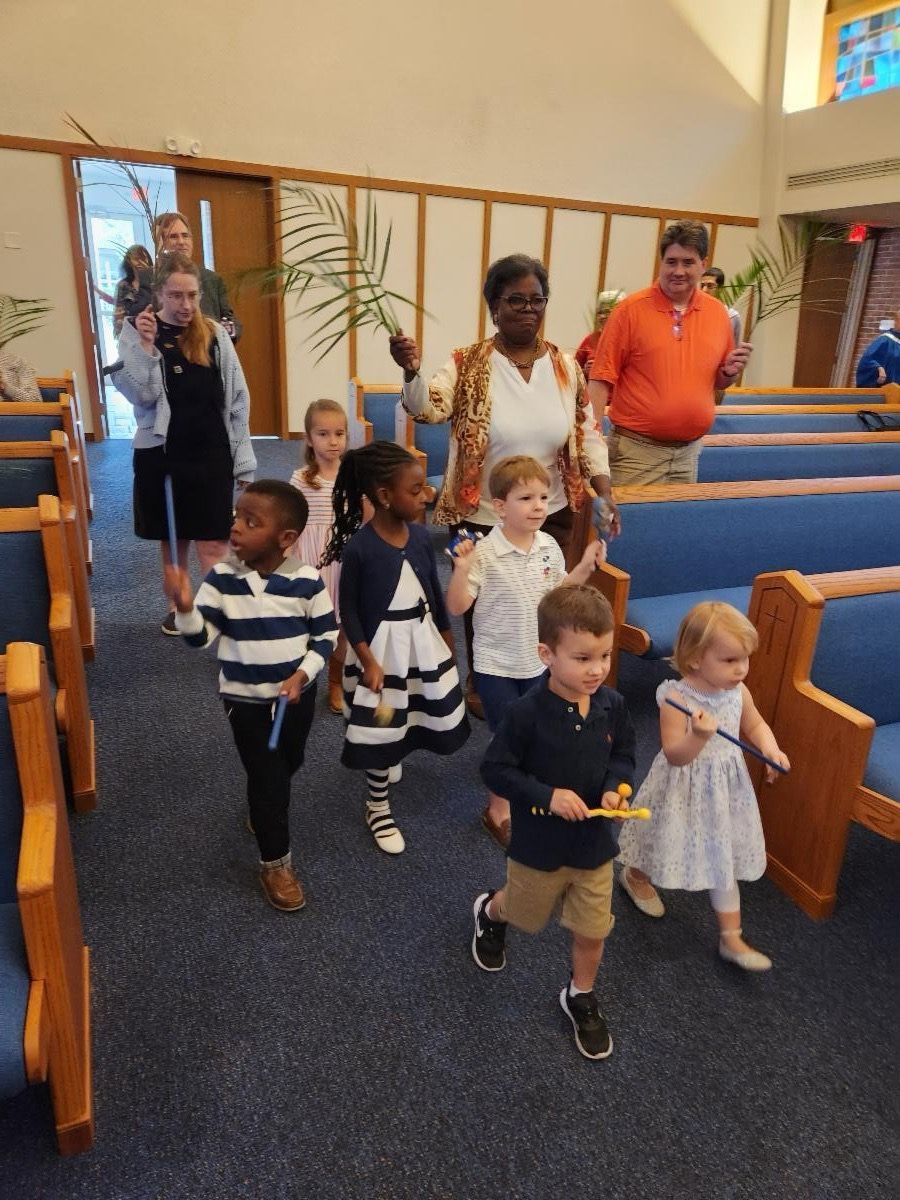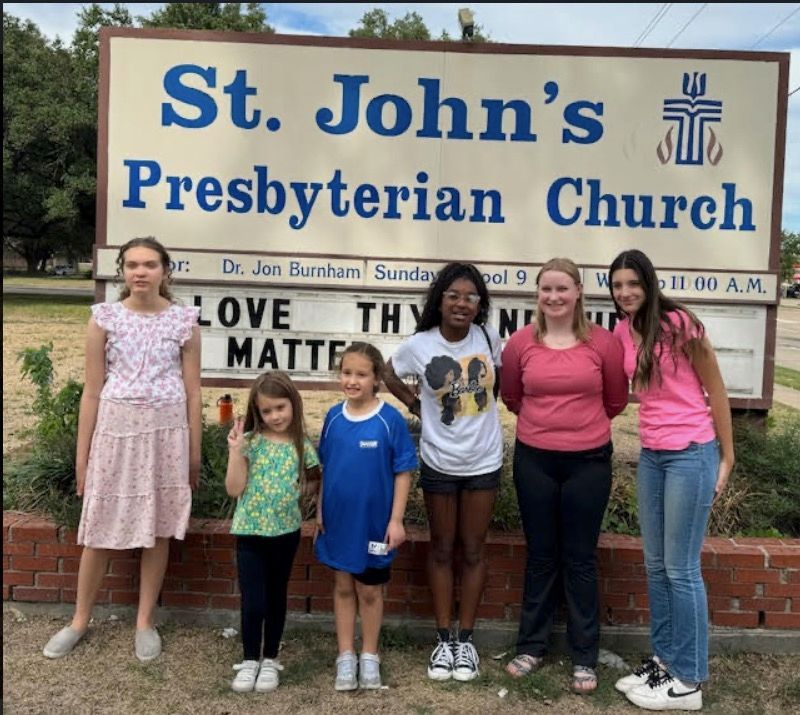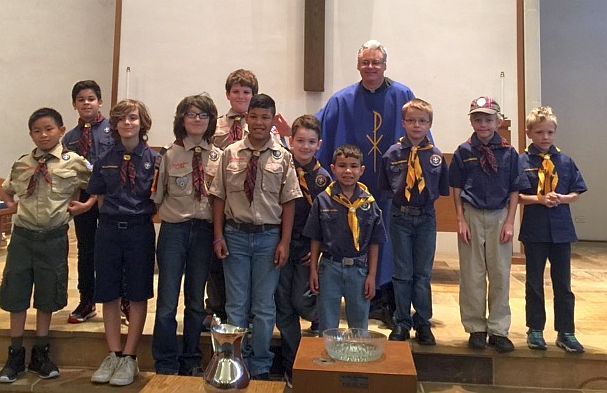About
Children's Ministry
What’s at St. John’s for Children?
Elementary Sunday School Class
Children's Ministry Houston: Why Small Churches Build Stronger Faith in Kids
When you're searching for a church home for your family in Houston, you'll find plenty of options with impressive children's programs. Elaborate stage productions for kids. Massive playgrounds. Separate worship experiences designed to entertain. All of it marketed as the best way to introduce your child to faith.
But here's what I've learned after years in ministry: the churches that actually form faith in children rarely look like that.
At St. John's Presbyterian Church, our children's ministry won't impress you with its size or spectacle. We don't have a children's pastor on staff or a multi-room kids' zone with themed environments. What we do have are two adults who know each child's name, a teaching approach that takes children's questions seriously, and a congregation that genuinely keeps the promises we make at baptism.
If you're looking for a place where your child will be known rather than numbered, where Bible stories are taught by people who actually believe them, and where faith formation happens through relationships that last years rather than programs that change every quarter, keep reading.
What Sunday Morning Actually Looks Like for Kids at St. John's
Our children's Sunday school meets from 11:00 AM to noon each Sunday in Building 2, in the room nearest the sanctuary. The timing is intentional. Parents can bring their children to Sunday school during the worship service, or if you prefer your child to sit with you during worship, that works too.
We've set up a rocking chair and small table in the back of the sanctuary specifically for parents with young children. You're welcome to use that space if your child needs to move around or if nursing a baby during worship makes more sense for your family. Nobody will mind. We're not trying to maintain some artificial standard of perfectly quiet worship.
The Sunday school room itself is bright and age-appropriate. Two adults are always present with the children. Always. This isn't negotiable, and it's written into our Child Protection Policy, which I'll discuss more in a moment.
Right now, our Sunday school is led by a young adult church member who teaches in Houston public schools during the week. She brings real educational training to the task of helping children engage with Scripture at their developmental level. She's joined by volunteer teachers who many of the kids call their church grandmothers, women who've been teaching Sunday school for decades and know how to make Bible stories come alive through storytelling and simple crafts.
This combination of trained educator and experienced volunteers creates something special. The kids get age-appropriate teaching methods from someone who understands childhood development, plus the warmth and personal attention of adults who genuinely love them and remember what each child said or asked the previous week.
Why We Take Child Safety This Seriously
Let me tell you about our Child Protection Policy, because if you're a parent considering St. John's for your family, you need to know how seriously we take the physical and emotional safety of children.
We established this policy years ago, working from a model developed by the Presbytery of New Covenant. The policy defines children as anyone from birth to 18 years old, and it covers every church activity where minors are present.
Here's what our policy requires. Any volunteer who works with children must be an active member of the church for at least one year. If they've been a member for less than a year, they can only work with children in tandem with a current, active member. Everyone who works with children must complete a Volunteer Information Form that includes reference checks.
For paid staff who work with children, we conduct criminal background checks through the Texas Department of Public Safety. We check at least three references. We maintain records in a locked file. We take this seriously because children deserve to be safe in church, and parents deserve to trust the adults caring for their kids.
Our policy also specifies adult-to-child ratios for different age groups. The general rule is that at least two adults must be present during any church activity involving minors. If those two adults are related (like a married couple or siblings), we add a third unrelated adult.
All classroom doors have windows or split doors. Any room without a window must keep its door open when children are present. These aren't arbitrary rules. They're safeguards that protect both children and the adults who work with them.
We also require signed parental permission forms for specific situations: when an adult might spend time alone with a minor (like tutoring), when transporting a minor, for any off-campus activity, and for special programs like overnight lock-ins or mission trips.
If you want to read the complete policy, ask. We're not hiding anything. We want parents to understand exactly how we protect their children.
The Kind of Faith Formation That Actually Works
Large churches with big children's programs often use pre-packaged curriculum with videos and elaborate lesson plans. There's nothing wrong with those materials. Some of them are quite good. But they tend to prioritize entertainment value over depth, and they assume that keeping kids engaged means constantly changing the approach.
At St. John's, our children's Sunday school takes a different path. We teach actual Bible stories. Not simplified versions that remove anything difficult or confusing. Not moralistic tales that reduce Scripture to "be nice to people." We tell children about Abraham and Sarah waiting for a son, about Moses arguing with God at the burning bush, about David facing Goliath, about Jesus calling fishermen to follow him.
We let children ask hard questions. When a six-year-old wants to know why God told Abraham to sacrifice Isaac, we don't deflect. We talk about it at a level they can understand. When a child asks if the people who crucified Jesus went to hell, we explore what the Bible actually says about forgiveness rather than offering easy answers.
We do crafts, but not as a substitute for teaching. The crafts reinforce what we're learning. After hearing about Noah's ark, kids might make a rainbow craft while talking about God's promises. After learning about Jesus healing the blind man, they might create a simple art project while discussing what it means that Jesus brings light into darkness.
This approach forms faith slowly, through repeated exposure to Scripture and through relationships with adults who take their questions seriously. It's not flashy. Kids don't go home talking about how fun Sunday school was. But years later, those Bible stories become the foundation for understanding who God is and how faith shapes a life.
What Growing Up at St. John's Gives Your Child
In a city as large and transient as Houston, many families live far from extended family. Grandparents are in other states. Aunts and uncles visit occasionally but aren't part of daily life. This isolation affects children more than we often realize.
Children who grow up with the support of extended family tend to be better socially adjusted. They have more adults who know them, care about them, and hold them accountable. They see different models of adulthood and different ways of navigating life's challenges. They have a broader support network when things get difficult.
A small church like St. John's can provide something like that extended family experience. The adults in our congregation know the children by name. They remember what grade each child is in. They ask about school and sports and music lessons. They notice when a child is absent and ask if everything is okay.
This isn't surveillance or nosiness. It's the natural result of being a community small enough that people actually know each other. When your child is baptized at St. John's, the whole congregation makes promises to help raise that child in faith. In a large church, those promises can feel abstract. At St. John's, they're lived out through specific relationships over years.
Your child will be known by the adults who teach their Sunday school class. They'll be known by the older adults who sit in the same pews every week. They'll be known by the teenagers who serve as acolytes and participate in youth group. They'll be known by the choir director if they join children's choir. Being known matters. It shapes how children see themselves and understand their place in the world.
The Spiritual Foundation That Lasts a Lifetime
Most children today won't learn Bible stories or basic Christian faith anywhere except church. Public schools don't teach this. Popular culture references biblical themes occasionally, but usually in distorted or superficial ways. If parents don't prioritize faith formation, children simply grow up without it.
This matters more than many parents realize. The Christian faith has withstood thousands of years in radically different cultures because it addresses fundamental human questions: Who am I? Why am I here? What is good? How should I live? What happens when I die? These aren't questions that become irrelevant as culture changes. They're the questions every human being eventually asks.
Children who grow up learning Bible stories and Christian theology have a framework for understanding the world and their place in it. They have language for talking about meaning and purpose. They have models of faithful living through biblical characters and church community. They have practices (prayer, worship, service) that connect them to something larger than themselves.
At St. John's, we don't pretend that going to Sunday school makes children perfect or guarantees they'll maintain faith as adults. We know that adolescence brings questions and doubts. We know that young adults often drift from church. We know that faith formation is complicated and that we can't control outcomes.
But we also know that seeds planted in childhood often bear fruit years later. The adult who returns to faith after years away almost always returns to something they learned as a child. The college student who joins a campus ministry group draws on knowledge of Bible stories and Christian practice learned in Sunday school. The parent who decides to baptize their own child remembers their own baptism and the community that nurtured their early faith.
We're planting seeds. Some will take root immediately. Others will lie dormant for years before sprouting. Our job is faithful planting, not anxious measuring of results.
Why We Don't Separate Kids From Adults in Worship
Some churches never have children in worship. They're always in separate programming designed specifically for them. The reasoning makes sense: kids get bored during adult worship, so why not give them something more engaging?
At St. John's, we offer Sunday school during worship primarily for practical reasons. Parents can focus on worship while their children are learning in an age-appropriate setting. But we also welcome children who stay with their parents during worship. We want children to experience worshiping alongside adults, to see what adult faith looks like in practice.
Children who grow up attending worship learn something important: faith isn't just for kids. They see adults singing hymns, praying, listening to Scripture, taking communion. They learn that worship is something the whole community does together, not separate experiences for different demographic groups.
Yes, young children get restless during worship. Yes, they ask questions at inappropriate times. Yes, parents sometimes need to step out with a fussy toddler. We're okay with all of that. A child asking "Why is the pastor wearing that robe?" during the sermon isn't a disruption. It's a sign that the child is paying attention and trying to understand.
The rocking chair and small table in the back of the sanctuary exist for parents who need flexibility during worship. Use them without guilt. Your presence matters more than perfect behavior from your children.
What About Teenagers?
Our youth program at St. John's looks different from the elaborate middle school and high school ministries at larger churches. We don't have a youth pastor or a youth building or weekly entertainment events. What we do have is a small group of teenagers who know each other well, adult leaders who care about them as individuals, and a focus on mission work that gives them hands-on experience serving others.
We support various mission initiatives that teenagers can participate in. We've worked with the Uganda orphanage at Lulwanda Children's Home, helping develop school curriculum and supporting the children there. We partner with Braes Interfaith Ministries, where teenagers can serve in practical ways. We've taken mission trips that give teenagers extended time to serve alongside adults.
This approach to youth ministry prioritizes depth over breadth. We're not trying to compete with school activities or provide entertainment. We're trying to help teenagers develop authentic faith and understand what it means to follow Jesus in the world. That happens through service, through conversations about real questions, and through relationships with adults who take their faith seriously.
Confirmation class at St. John's prepares teenagers to profess their own faith. This isn't just learning Presbyterian doctrine. It's wrestling with what they actually believe and whether they're ready to claim for themselves the faith into which they were baptized as children. Some teenagers go through confirmation and decide they're not ready yet. We respect that. We'd rather have honest doubt than false profession.
The Honest Reality of Small Church Children's Ministry
Let me be direct about what St. John's children's ministry isn't. We're not going to compete with the megachurch down the road that has separate programming for every age group, a massive budget for kids' activities, and staff members dedicated full-time to children's ministry.
We can't offer weekly children's events or elaborate vacation Bible school productions or children's choirs with professional directors. Our children's ministry is simple, relational, and entirely dependent on volunteers who show up week after week because they love the kids and believe in what we're doing.
Some families will visit St. John's and decide we're not the right fit because our children's program doesn't match what they're looking for. That's okay. We're not trying to be everything to everyone. We're trying to be faithful to our particular calling as a small, mission-focused congregation that takes relationships seriously.
But here's what we can offer that many larger churches struggle to provide: genuine intergenerational community where your child is known by name, where volunteers stick around for years rather than rotating through quickly, where adults keep the promises they make at baptism, and where children see what authentic Christian faith looks like in daily practice.
We can offer safety policies that we actually follow rather than impressive documents that exist mostly on paper. We can offer theological depth rather than entertainment. We can offer patient faith formation that prioritizes long-term discipleship over short-term engagement metrics.
The Benefits No One Talks About
Research on childhood development consistently shows that children who grow up with strong relationships outside their immediate family tend to be more resilient, more socially competent, and better able to navigate life's challenges. Church community provides exactly this kind of support network.
Children who attend St. John's know adults who aren't their parents but who care about them. They have older teenagers who serve as role models. They have peers who share similar values. They participate in a community that extends beyond their school or neighborhood.
This matters practically. When your child struggles with something, they have adults they can talk to who aren't their parents. When your family faces a crisis, you have a community that shows up with meals, childcare, and emotional support. When your child needs to see that faith matters beyond Sunday morning, they observe adults serving at Braes Interfaith Ministries or supporting mission work in Uganda.
Children who grow up at St. John's also learn to be comfortable with different generations. They talk with older adults after worship. They help with fellowship meals where everyone sits together. They participate in intergenerational mission projects. This comfort with age diversity serves them well throughout life.
There's also something powerful about children learning that church isn't primarily about them. Modern children's ministry often implies that church exists to entertain kids and meet their needs. At St. John's, children learn that church exists to worship God and serve the world. They're important members of the community, but the community doesn't revolve around them. This shapes their understanding of what matters and where they fit in the bigger picture.
How to Visit With Your Kids
If you're interested in checking out St. John's with your children, here's what I'd suggest. Come for worship at 11:00 AM on a Sunday. Bring your kids with you to worship, at least initially. Let them experience what worship is like before deciding whether to use the Sunday school option.
After worship, stick around for coffee hour under the covered breezeway at the sanctuary exit. This is when you'll meet the Sunday school teachers and other families. You can ask questions about the children's program, tour the Sunday school room, and get a feel for whether St. John's might be a good fit.
If you decide to try Sunday school, just let someone know before worship and they'll make sure your child is welcomed. You'll need to fill out a basic registration form so we have emergency contact information and know who's authorized to pick up your child. This is part of our Child Protection Policy.
Don't feel pressure to commit immediately. Visit a few times. Let your children experience different aspects of what we do. Talk with other parents about their experience. See whether the relationships that form feel genuine and whether the faith formation approach aligns with what you're looking for.
You can reach our church office at 713-723-6262 or email office.sjpc@gmail.com with any questions. We're located at 5020 West Bellfort Avenue in southwest Houston, in the Westbury area.
What We're Actually Offering
At the end of the day, St. John's children's ministry offers something simple but increasingly rare: a small community of adults who take seriously the promises they make to nurture children in Christian faith.
We offer relationships that last for years, not programs that change every quarter. We offer theological depth appropriate to children's developmental levels, not entertainment disguised as faith formation. We offer genuine intergenerational community, not age-segregated programming. We offer practices (worship, prayer, service) that connect children to two thousand years of Christian tradition, not contemporary gimmicks that will feel dated in five years.
We offer safety policies we actually follow, teachers who genuinely care about each child, and a congregation that keeps its baptismal promises through showing up week after week to teach Sunday school, prepare fellowship meals, support mission work, and maintain a community where children are known and loved.
If you're looking for a large children's program with separate worship experiences and elaborate activities, we're not the right fit. But if you're looking for a church where your child will be known by name, where relationships run deep, where faith formation happens slowly through Scripture and community rather than quickly through entertainment, and where the whole congregation takes responsibility for nurturing the next generation, come visit.
Your kids might not think Sunday school at St. John's is the most exciting hour of their week. But years from now, they might realize it was one of the most formative.
Learn more
As you consider bringing your child with you to worship St. John's, you may also want to explore how we handle baptism. You may also want to view a worship bulletin from a Sunday worship service. You may also want to consider the challenges of church shopping in Houston today.
If you would like to speak to our Pastor before you visit with your child, email Pastor Jon or call the church office at (713) 723-6262 and speak with the volunteer secretary or leave a message and your phone number and Pastor Jon will soon call you back.
Child’s Bible Study for Life
Sunday Morning Worship
During the worship service, there is a special message for the children, and then those children second grade or younger may leave the sanctuary to attend Children’s Church designed just for them. Children of any age are always welcome to remain with their parents in the regular worship service.
Children’s Choir
The children share their music in worship on a regular basis. All children are welcome!
Scouts
St. John’s sponsors Girl Scouts and Boy Scouts within the Southwest District Arrow.
